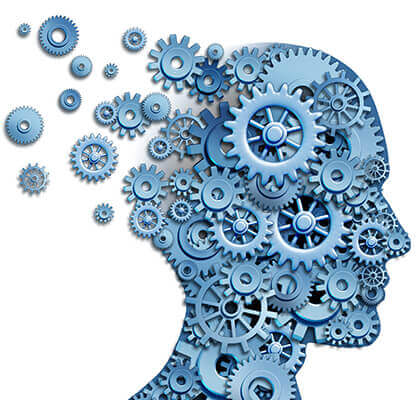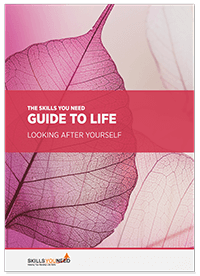Personal Skills for the Mind
See also: Relaxation TechniquesYour mind is an extraordinarily powerful thing.
It is not just what makes you into you: the person that you are. It also has the power to make you into more than you are, by helping you to motivate yourself and to strive to achieve more, to learn and to develop. And it also has the power to make you less: for example, witness the debilitating effects of psychosomatic illnesses or a crippling lack of self-belief.
This section of Skills You Need deals with looking after your mind, and with harnessing its power to help you to achieve more, and particularly to achieve the right things for you. It describes some useful mind-skills, including Creative Thinking and Memory Skills.
It also deals with the other side of the coin: what happens when you cannot look after your mind, and you develop a mental illness.
Help, support and advice
Our pages on Managing Common Mental Illnesses aim to provide some advice about some mental illnesses, and ways in which you start to cope. However, they are no substitute for medical help and support. If you think you may have one of these illnesses, you are strongly advised to go and see a doctor or other healthcare professional, and get some help.
Our section on Personal Skills for the Mind is split into four main sections:
- Looking After Your Mind
- Harnessing the Power of Your Mind
- Mind-Skills
- Managing Common Mental Illnesses
Looking after your mind is every bit as important as looking after your body in terms of maintaining your overall health.
A growing body of studies suggests, too, that many of the same things are important for physical and mental health. These factors include sleep, diet and exercise.
There is more about this on our page:
Keeping Your Mind Healthy.
But there is more to keeping your mind healthy than simply eating well and exercising. Increasingly, the suggestion is emerging that some form of self-reflection or meditation can be extremely helpful in maintaining a healthy balance in your mind.
Our pages on Mindfulness and Reflective Practice provide more information about some of the ways in which you can do this.
The ‘placebo effect’ is the well-documented phenomenon that people can recover from illness simply because they think they are being treated with an effective drug.
It is perhaps the best known example of the mind affecting physical health. But there are many more, and you can learn more in our pages on:
Did you know that how you think can affect whether or not you achieve success?
Research at Stanford University suggests that the crucial aspect is whether or not you think that you can change. This is known as ‘mindset’, and there is more in our page on The Importance of Mindset.
Neuro-Linguistic Programming is the idea that you can change how you feel by changing how you think about past events. It suggests that feeling, like thinking, is something that you do. You can, therefore, control it. You will find more about practical ways of doing so in our page on the subject.
Like the previous section, this section focuses on harnessing the power of your mind.
This section, however, addresses particular skills that require you to use your mind, rather than overall approaches to change or improvement.
Many of our pages might reasonably be said to describe ‘mind-skills’.
But two areas, in particular, require a developed ability to use your mind consciously:
Creative Thinking and Memory Skills.
However much you may look after your body, sometimes you become ill.
You catch colds, or even develop more serious illnesses. The same goes for your mind.
Some people are more prone to mental illness than others, but nobody is immune.
Considerable effort has recently been put into reducing the perceived stigma of mental illness, but many people still find it difficult to acknowledge that they are having problems.
There is more about some of the most common mental illnesses on our pages Anxiety, Depression and Eating Disorders.
You may also find our pages on Types of Depression and Treatments for Depression useful.
For those whose depression or mental health problems come and go with the seasons, it may be helpful to read our page on Seasonal Affective Disorder (SAD).
Parents in particular may be interested to read our page on Teenagers and Mental Health, because many of these conditions first manifest during adolescence.
Anxiety should not be confused with status anxiety, which is perhaps more a feeling of missing out, or that others are better, or are doing better, than you.
Our page on Managing Status Anxiety provides advice on how to manage this.
There are also other conditions that affect your mind—or at least, your brain, and particularly how you perceive the world and process information. You can find out more about specific learning difficulties in our pages on Dyslexia, Dyspraxia and Dyscalculia. You may also be interested in our pages on Understanding Autism Spectrum Disorder and Understanding Attention Deficit Hyperactivity Disorder.
One issue that is often associated with mental health problems is loneliness. It is not clear whether being lonely may lead to mental health problems, or if mental illness is very isolating—or both. However, overcoming loneliness can be an important first step to avoiding mental health problems. There is more about how to do this in our page on Loneliness.
Further Reading from Skills You Need
The Skills You Need Guide to Life: Looking After Yourself
Based on some of our most popular content, this eBook will help you to live a happier, healthier and more productive life.
Learn how to look after your body and mind: the fundamental first steps to personal development.
This eBook, now in its second edition, with new and revised content, is designed to make life both easier and better.
Continue to:
Stress Management
Assertiveness






